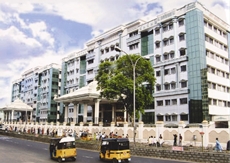RBI allows low-cost housing schemes to tap foreign funds
17 Dec 2012
The Reserve Bank of India (RBI) has allowed realty firms and housing finance companies to borrow overseas through external commercial borrowing (ECB) for funding low-cost housing projects.
 However, companies may take recourse to foreign funds only after getting prior approval from the Reserve Bank, according to a notification issued by the central bank.
However, companies may take recourse to foreign funds only after getting prior approval from the Reserve Bank, according to a notification issued by the central bank.
RBI said it has reviewed the policy related to ECB, keeping in view the announcement made in the union budget for the 2012-13 financial year and ''decided to allow ECB for low-cost affordable housing projects as a permissible end-use, under the approval route.''
''ECB can be availed of by developers/builders for low cost affordable housing projects. Housing finance companies (HFCs)/ National Housing Bank (NHB) can also avail of ECB for financing prospective owners of low-cost affordable housing units'', RBI said in its notification.
For ECB purposes, RBI has defined low-cost affordable housing project as one in which at least 60 per cent of the permissible FSI would be for units having maximum carpet area up to 60 sq metres.
Slum rehabilitation projects will also be eligible under the low-cost affordable housing scheme. The eligibility of slum rehabilitation project for ECB will be based on the parameters to be set by the central sanctioning and monitoring committee of the Affordable Housing in Partnership (AHP) scheme constituted under the chairmanship of secretary, Housing and Urban Poverty Alleviation (HUPA), which administers the slum rehabilitation projects.
However, only developers/builders with proven financial track record will qualify for availing ECB for low-cost affordable housing projects.
Developers / builders:
- Such developers/builders undertaking low-cost affordable housing projects should be a company registered under the Companies Act, 1956;
- They should have minimum 5 years' experience in undertaking residential projects, and should have good track record in terms of quality and delivery;
- The developers/builders should not have defaulted in any of their financial commitments to banks/ financial institutions or any other agencies;
- The project should not be a matter of litigation;
- The project should be in conformity with the development plan of the area and should conform to the land use stipulated by the town and country planning department for housing projects; and
- All necessary clearances from various bodies, including revenue department with respect to land usage/environment clearance, etc, should by available on record.
Housing finance companies:
- The HFC should be registered with the National Housing Bank (NHB), and operating in accordance with its regulatory directions and guidelines;
- The minimum paid-up capital, as per the latest audited balance sheet, should not be less than Rs50 crore;
- Should have minimum net owned funds (NOF) of a minimum Rs300 crore for the past three financial years;
- ECBs should be within the HFC's overall borrowing limit of 16 times their met owned funds (NOF);
- The net non-performing assets (NNPA) should not exceed 2.5 per cent of the net advances;
- The maximum loan amount sanctioned to the individual buyer will be capped at Rs25 lakh and the cost of the housing unit should not exceed Rs30 lakh; and
- The ECB should be swapped into rupees for the entire maturity on fully hedged basis.
Besides HFCs, NHB will be eligible for raising of ECB for financing low-cost affordable housing units of individual borrowers. Further, in the event a developer of low-cost affordable housing project not being able to raise ECB directly as envisaged above, NHB should be permitted to avail of ECB for on-lending to such developers who satisfy the conditions subject to the interest rate spread set by RBI.
Such ECB proceeds should be utilised only for low-cost affordable housing projects and should not be utilised for acquisition of land.
Builders/developers meeting the eligibility criteria should apply to the NHB, which is the nodal agency, in the prescribed format, for deciding a project's eligibility as a low-cost affordable housing project, and on being satisfied, forward the application to the RBI for consideration under the approval route. Once NHB decides to forward an application for consideration of RBI, the prospective borrower (builder/developer) will be advised by the NHB to approach RBI for availing ECB through his authorised dealer in the prescribed format.
NHB will issue separate guidelines with respect to the format of application, project monitoring, etc..
Developers/builders/HFCs/ NHB will not be permitted to raise foreign currency convertible bonds (FCCBs) under the scheme.
RBI has set an aggregate limit of $1 billion for ECB under the low-cost affordable housing for the financial year 2012-13. This includes ECBs to be raised by developers/builders and NHB/specified HFCs. This limit is subject to annual review.
All other ECB parameters, such as, recognised lender, minimum average maturity period, all-in-cost ceilings, restrictions on issuance of guarantee, choice of security, parking of ECB proceeds, prepayment, refinancing of ECB, reporting requirements remain unchanged shall also be complied with.
The amended policy will come into force with immediate effect and the scheme will be reviewed after a period of one year based on the experience gained in the implementation of the scheme, RBI said.


















